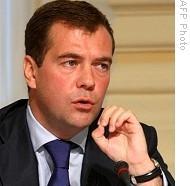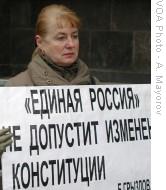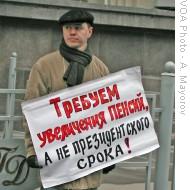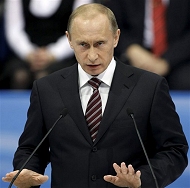-
(单词翻译:双击或拖选)
 |
| Russian President Dmitri Medvedev (file photo) |
Just 16 days after President Dmitri Medvedev proposed amending4 the Russian Constitution to extend the presidential term from four years to six, the lower house of parliament voted 392 to 57 in favor. Only the Communists voted against, saying the move signals an authoritarian5 trend in Russia. The upper house of Parliament, where the ruling United Russia also dominates, is expected to approve the amendment next week and so too are two-thirds of Russia's regional legislatures.
When he made the proposal on November 5, President Medvedev did not elaborate on the rationale for extending not only the chief executive's term in office, but also that of parliamentarians who will do the voting.
These issues, says the Kremlin leader, have been raised many times, beginning in the 1990s, and many base their support on history, which records numerous instances of democratic governments changing the terms of state office. Mr. Medvedev says he would not enumerate6 those instances, because they are well known.
With the exception of small opposition7 protests that were not widely covered by the media, there was virtually no public discussion of the issue in Russia over the past two weeks. And Yevgeni Volk, a political analyst8 at the Heritage Foundation in Moscow, says he does not recall any such deliberations in the 1990s. He says the speed with which the amendment is advancing is a deliberate move on the part of Russia's power structure.
Volk says everything is done to limit opportunity for discussion as much as possible, to avoid examining the merits of extending terms of office. He says Russian authorities are acting9 in their traditional style, not only ignoring public opinion, but also any free review of these initiatives.
A survey released Friday by the Russian Public Opinion Research Center indicates 22 percent of Russians fully10 support extension of the presidential term, 33 percent probably favor it, 29 percent are opposed, and 15 percent have no opinion. However, the Center has been accused by the New Times, an independent Internet publication, of interpreting data according to Kremlin needs.
 |
| Irina |
It takes two weeks to obtain a demonstration11 permit in Moscow, so there were only a handful of people representing small opposition parties to protest outside of parliament as members inside voted to extend the terms of president and of legislators after the next elections. Irina of the Yabloko party told VOA that ordinary Russians believe dissent12 is futile13.
Irina says people who are opposed to the government feel that any protest ends in failure and the power structure is impenetrable.
 |
| Sergei Shkolniy |
Another protester, Sergei Shkolniy of the United Civic14 Front says ordinary Russians not only have a tradition of avoiding political activism, but are also afraid.
Shkolniy says many people walk by and blurt15 out that he is right to protest, but nobody speaks out publicly. The activist16 notes there are some organizations in Moscow that draw 300 people for rallies, but adds that if 100,000 showed up, the effect would be altogether different.
 |
| Russian Prime Minister Vladimir Putin addresses the tenth United Russia Party Congress in Moscow, 20 Nov 2008 |
Some political observers say extending the presidential term is a maneuver17 to bring back former President Vladimir Putin, who is now Russian Prime Minister. Yevgeni Volk agrees.
Volk says the speed with which the amendment is being approved is clearly aimed at realizing another Putin presidency18, because each day of the global economic crisis represents a certain threat to Putin's position as a national leader. Volk says this is because people consider the head of government responsible for the economy. The analyst adds that if the crisis continues or deepens, this would have a negative effect Putin's popularity.
The Russian Constitution prohibited Mr. Putin from serving more than two consecutive19 terms as President. If his hand-picked successor, Dmitri Medvedev, were to step aside, the former president could return to office for two more terms. And if those terms are extended as expected, Mr. Putin could return as Kremlin leader for 12 years. Afterwards, Dmitri Medvedev would only be in his mid-50s and could conceivably serve yet again.
 收听单词发音
收听单词发音
1
amendment

|
|
| n.改正,修正,改善,修正案 | |
参考例句: |
|
|
|
2
input

|
|
| n.输入(物);投入;vt.把(数据等)输入计算机 | |
参考例句: |
|
|
|
3
supreme

|
|
| adj.极度的,最重要的;至高的,最高的 | |
参考例句: |
|
|
|
4
amending

|
|
| 改良,修改,修订( amend的现在分词 ); 改良,修改,修订( amend的第三人称单数 )( amends的现在分词 ) | |
参考例句: |
|
|
|
5
authoritarian

|
|
| n./adj.专制(的),专制主义者,独裁主义者 | |
参考例句: |
|
|
|
6
enumerate

|
|
| v.列举,计算,枚举,数 | |
参考例句: |
|
|
|
7
opposition

|
|
| n.反对,敌对 | |
参考例句: |
|
|
|
8
analyst

|
|
| n.分析家,化验员;心理分析学家 | |
参考例句: |
|
|
|
9
acting

|
|
| n.演戏,行为,假装;adj.代理的,临时的,演出用的 | |
参考例句: |
|
|
|
10
fully

|
|
| adv.完全地,全部地,彻底地;充分地 | |
参考例句: |
|
|
|
11
demonstration

|
|
| n.表明,示范,论证,示威 | |
参考例句: |
|
|
|
12
dissent

|
|
| n./v.不同意,持异议 | |
参考例句: |
|
|
|
13
futile

|
|
| adj.无效的,无用的,无希望的 | |
参考例句: |
|
|
|
14
civic

|
|
| adj.城市的,都市的,市民的,公民的 | |
参考例句: |
|
|
|
15
blurt

|
|
| vt.突然说出,脱口说出 | |
参考例句: |
|
|
|
16
activist

|
|
| n.活动分子,积极分子 | |
参考例句: |
|
|
|
17
maneuver

|
|
| n.策略[pl.]演习;v.(巧妙)控制;用策略 | |
参考例句: |
|
|
|
18
presidency

|
|
| n.总统(校长,总经理)的职位(任期) | |
参考例句: |
|
|
|
19
consecutive

|
|
| adj.连续的,联贯的,始终一贯的 | |
参考例句: |
|
|
|















